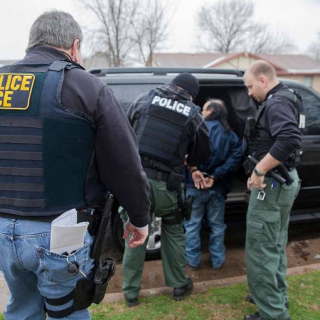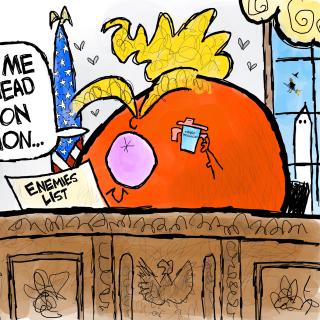Advertisement
At a recent gathering some homosexual men were discussing the salary one spends on an engagement ring. “Someone told me four months, but I think it’s only two. Yeah, but she wants a ring from Tiffany’s.”
Sound familiar? Gays discuss the same things about marriage as heterosexuals, but in Ohio without the hope of actually getting married. Bret Richards (a.k.a. Hellin Bedd) and her partner David Cullison, both of Columbus, have been dating for 16 years and engaged for a year and a half. Richards said they might get married if it is ever legal, but it is not critical.
“For us, it’s not the desperation to get married,” Richards said. “A segment of the gay population romanticizes it. We have friends in their second and third marriages and we see a lot of couples break up young. I could care less if we get married or not – our relationship won’t change. The main thing is having the ability like everyone else.”
“We could stand up, have a have a party and profess our love for each other, but we do that every night,” Cullison said.
For Cullison it is all about the word. The U.S. Constitution is silent on the definition of marriage. He hears discussions about what defines marriage, and how the legalization of marriage equality might eventually reduce marriage to such unions as between a toaster and a man or a dog and a man. That is not even the same species, he said.
“Those who do not allow marriage define it as a union between one man and one woman,” he said. “If the legislative hold up is over the word, I don’t care if they call it swizzle sticks. Let’s move past that as long as we get the rights that go along with it.”
Every single day Ohioans are refused the right to marry.
“As a result, they are experiencing harms,” Christopher Geggie said. Geggie is campaign manager for “Why Marriage Matters of Ohio.” Some of those harms include: same sex couples can only name one person on their child’s birth certificate, same sex marriages are not recognized on death certificates and same sex couples are denied hospital visitation rights, if their partners are unconscious and unable to speak for themselves. Some of those issues were the subjects of the U.S. Supreme Court argument, April 28, on whether Ohio and three other states violated the Constitution when they banned same-sex marriages. The court’s decision is expected in late June.
A growing majority of Ohio residents support marriage for same-sex couples. A September, 2012, poll showed that 52 percent of voters think marriage should be legal, in contrast to 37 percent who are opposed. In 2004, nearly two-thirds of Ohio voters - 62 percent - supported a constitutional amendment defining marriage as "only a union between one man and one woman." (Washington Post, September 2012) Washington Post poll (http://www.washingtonpost.com/wp-srv/politics/polls/postFLOHpoll_20120923.html).
What was the driver of change? The most effective outcomes, both at the ballot and in the legislature, spring from the grass roots organizations, Geggie said. The campaigns in other states were successful due to the ability to engage people to work together in their own communities. Personal shared interactions matter, such as: I am a Latin American and I want marriage equality, my sister is a lesbian and she wants to marry her partner of 20 years or I am a person of faith and I want to marry my partner.
Speaking of faith, Cullison sees a weak argument. He is bothered by the hypocrisy of some God-fearing Christians upholding a stringent ideal of marriage, without maintaining that same ideal, he said. For example, in some cases, people officiating marriages are given license to do so by taking an on-line course. Also, many ministers are wed multiple times.
“If we are talking about the sanctity of marriage, why aren’t their rules on the other side? Why are there repeat marriages? Why don’t the religious make it harder to get divorced or make it so people only have the right to wed once?” Cullison asked. “I am not faulting them. We just want to do it once. They are the same people faulting us.”
Aaron Eskins, of Columbus is also bothered by the religious argument.
“If we’re going to use the Bible, then let’s do what the Bible says - no divorces,” he said. “To me, it’s not about flaunting that I’m married. I only want my spouse to be able to get my assets.”
Chester Workman, of Pickerington has dated a man for two years and said he would get married if it was legal. He believes folks are confused about God’s relationship with humans.
“People throw religion around in every situation. Marriage should be between one man and one woman they say. That is not what I was taught who the loving God is. God is not as hateful as everyone describes,” he said.
Can Gays love God?
A broad range of religious groups, organizations and leaders, including nearly 2,000 individual clergy living in the United States - signed onto an Amicus Brief that was submitted to the U.S. Supreme Court March 6. This brief argues in favor of civil marriage for same-sex couples. Out of the total, 179 signatures were from Ohio.
“That was the largest delegation to sign onto that brief,” Geggie said. “Even though we are diversely faithed, we still think it is the right thing to do.”
Bill Finn and members of The Common Thread are not confused. They are a ministry of clarity.
“The lesbian, gay, bisexual and transgender (GLBT) community is part of the 'Whosoever' mentioned in the Bible in John 3:16,” Finn said. “For God so loved the world that he gave his only begotten son that WHOSOEVER believeth in him should not perish, but have everlasting life.”
Finn, Dusty Gurney and Greg Sergent, all of Columbus, are some of the founding members of The Common Thread Affirming Ministries that began in November, 2013. The ministry members believe that all mankind is bound together by a common thread and are all created equally by the master creator, Jesus Christ. The group started from a desire to reach out to the wounded and broken-hearted; those that have been rejected or ostracized from their mainstream denominational churches. Many dealt with ex-communication. Some are ordained ministers. Many felt alienated as a result of being asked to leave their churches or to stay, but not participate in leadership roles. They want a place where there is room for them.
“There is always room at this table. We all need God. The church says you can’t be saved and be gay. We couldn’t accept losing our faith,” Finn said.
The Common Thread’s message is no different than any other church’s message. They teach the same Bible – the one that has Jesus Christ as the savior. They share the word and through that people find their purpose. The people they have drawn in are from all different Christian backgrounds. Something unexpected was the accompaniment of baggage people sometimes bring to them - a baggage of addictions to distract them from their problems.
“Those who were asked to leave are hurt. Some who don’t have a strong intimate relationship with God, have lashed out. It is human nature. We are here to try to bring healing to that,” Finn said.
As a result, the members prayed and studied to help the broken and bruised, Finn said. They are able to help them through the fundamentals, prayer and leadership.
“We don’t judge people. God loves without condition – people need to strive for that type of love,” Finn said.
One of Finn’s goals is to help build a bridge between the gay and straight community churches. About two years ago, every Sunday he started attending a straight church in hopes that the church will see from his daily life, he is faithful to the Lord and loves Him and His word just like they do.
“People are more tolerant, open and loving. We pray and pray every day that we will reach people,” he said.
In November of 2009, Josh Culbertson walked out of his Zanesville, Ohio church, in tears. He was born and raised in Zanesville and spent 13 years, from age 20 – 33, living as an ex-gay. Ex-gays are people that acknowledge they are gay and believe they can change. He led a group in the church striving for the same reform. When Culbertson first attended the group and began meeting the other men, he noticed they were married and had all the things he thought he needed to be content. But he soon discovered that their lives were a mess and they were unhappy.
“Many were impotent,” he said. “The moment that finally broke me was when one of the men in the group broke down one night and could barely speak. He shared with us that he and his wife had been intimate earlier that week, and he was broken about it because he couldn’t be with her without fantasizing about another man. I thought I can’t do this. I got out of there that night, drove home and prayed, tears streaming down my face all the way home. I wasn’t sure what it meant. I didn’t know if I could be a man of faith. Four months later, I walked up to the pastor and gave him my keys. I knew I was leaving my whole world behind, but I couldn’t stay there with any kind of integrity.”
That was in 2009. Although he was reluctant to be out and proud, the next year, a friend dragged him to PRIDE, in Columbus. He was shocked to see politicians, businesses and churches in the parade. Culbertson noticed 80 percent of them were from the United Methodist churches. He contacted a professor at United Seminary, in Dayton, who connected him with Reconciling Ministries. He connected with a congregation that he is now affiliated with, the Broad Street United Methodist Church, in Columbus, where he is the chair of the Reconciling Committee. The role of that committee is to ensure a language and environment in the service that is inclusive, regardless of gender identity and family configuration.
Culbertson also engages in community outreach and has interface services for such organizations as “Equality Ohio” and “Why Marriage Matters,” to show support for the Equal Housing and Employment Act and marriage equality. He is working with a representative from the Ohio chapter of the National Association of Social Workers, because they are trying to get a ban passed to prevent minors from being forced by parents into sexual conversion therapy. He is also working on earning his master’s degree at a seminary in Delaware to help those conflicted with sexuality.
“I hope to help others find a place of peace faster than I did. I no longer believe people can change their sexual orientation or that it is healthy to encourage them to do so,” he said.
And while individual churches are given flexibility, another one of Culbertson’s goals is to try to change the language in “The United Methodist Book of Discipline” for the Qualifications for Ordination, 304.3 that state:
While persons set apart by the Church for ordained ministry are subject to all the frailties of the human condition and the pressures of society, they are required to maintain the highest standards of holy living in the world. The practice of homosexuality is incompatible with Christian teaching. Therefore self-avowed practicing homosexuals1 are not to be certified as candidates, ordained as ministers, or appointed to serve in The United Methodist Church.
“It is important that gays and lesbians are in leadership. Churches throw around the phrase ‘all our welcome,’ but I need to know that I am safe. It’s very important for people to know they are in a safe environment where people won’t try to change them and make them into something they are not.
Young people need to be able to look forward and know they can have a life that is as committed and stable as everyone else’s, if that is something they choose. It should be available to them. I want to share my life with someone. And yes, one day I would like to be married,” Culbertson said.
The Common Thread Bible Study Sessions occur every Friday at 7:30 p.m. on the second floor at the Stonewall Center located at 1160 North High Street in Columbus, Ohio. Please feel free to contact Bill Finn at 740-816-3282 or 614-861-4050. For more information, visit http://commonthreadaffirmingministries.weebly.com



